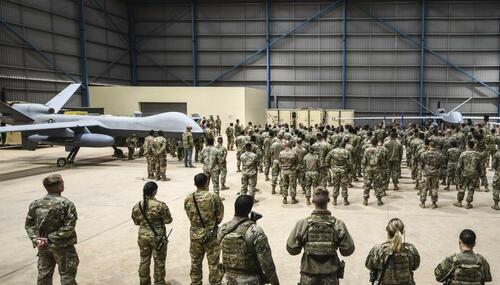Niger announced over the weekend that it is suspending military cooperation with the United States, in a significant blow to the Pentagon's presence in West Africa, which is likely to result in Washington being forced to withdraw its troops, also in a major blow to AFRICOM's influence on the continent.
Last year's coup saw a military-led government come to power, which from the start signaled rough and uncertain times ahead for US-Niger relations. A Saturday statement by Nigerien junta spokesman Col. Maj. Amadou Abdramane said, "Niger regrets the intention of the American delegation to deny the sovereign Nigerien people the right to choose their partners and types of partnerships capable of truly helping them fight against terrorism."
This charge of the US not respecting the West African nation's sovereignty comes in reaction to recent Western intelligence claims that Niger has been engaged in secret talks and deal-making to grant Iran access to its uranium. US officials have also bitterly complained about Niger cozying up to Moscow.

Col. Abdramane addressed the accusation directly: "The government of Niger rejects the false allegations of the head of the American delegation to maintain that it has signed a secret agreement on uranium with the Islamic Republic of Iran," he said.
American officials are now worried about the major drone base only recently built at a cost of $110 million called Air Base 201, which was crucial for Pentagon drone surveillance operations over the region. Likely it will now have to be shuttered.
Since the ouster of President Mahamoud Bazoum by military generals, the Biden administration has been scrambling to find influence amid fears the junta is cementing ties with Russia as well as the two neighboring countries also 'unfriendly' to the West: Mali and Burkina Faso, also led by juntas.
Among the first major acts that Niger’s post-coup government did was to expel France's some 1,500 troops - all of which finally left in December. For months it has been expected that the other big 'imperial power' - the United States - would soon be booted too. The US is commonly estimated to have 1,100 troops in the country.
As for the accusation of deepening ties with Iran and a uranium deal on the table, US officials have made this front and center in meetings with Niger leaders over the past week. Anonymous US officials have told The Wall Street Journal that though not finalized, talks between Niamey and Tehran have reached an advanced stage.
But it appears the junta leaders have had enough, as WSJ details:
Those concerns came to a head over the past week, when Molly Phee, U.S. assistant secretary of state for African affairs, traveled to Niamey for talks with the junta on the two countries’ future relations and what the State Department said would be discussions on “Niger’s return to a democratic path.”
Phee was accompanied by Celeste Wallander, a senior Defense Department official, and Gen. Michael Langley, the head of the U.S. Africa Command, the State Department said.
During the meetings, Phee raised Washington’s alarm with officials in Niger about an agreement with Iran, according to officials in the U.S. and Niger, who described the meetings as very tense. Phee also criticized the lack of progress in returning Niger to an elected government and raised U.S. concerns about the imminent arrival of Russian military trainers and equipment.
With Russia moving in (and especially mercenaries like Wagner fighters), is the US about to hastily be forced out?

Interestingly, the whole thing is eerily reminiscent of the Iraq uranium yellowcake hoax which was crucial in the Bush administration selling the war in Iraq to the public. Currently the big scare over "WMD" and potential nuclear weapons capability is centered on Iran, at a moment the Middle East stands on the precipice of a potential major war connected to Gaza.
And like with Iraq and uranium yellowcake stories from 2003, these new allegations of the possible transfer of uranium from Niger to Iran are sourced to vague intelligence assertions and anonymous officials. But one thing is clear - the Niger junta is busy forging deepening ties to 'rogue' regimes not liked by Washington, and is proudly and openly doing it. The US meanwhile has limited options and can't do anything about it, other than perhaps pinning its hopes on another coup.
